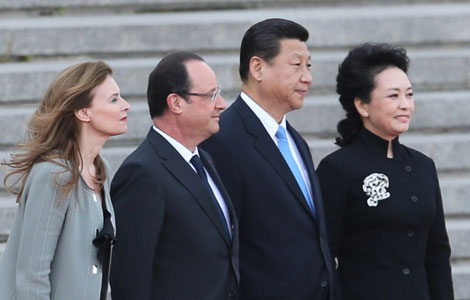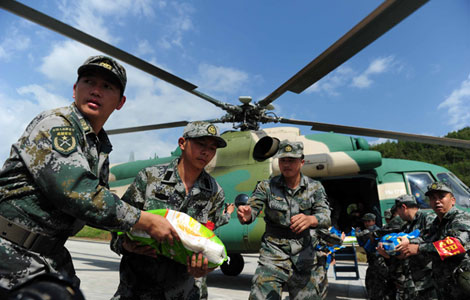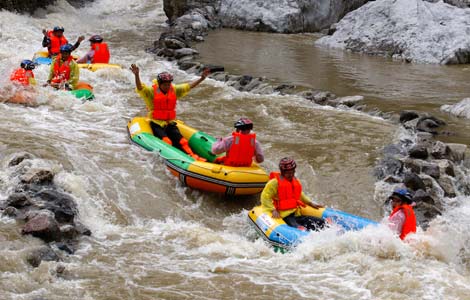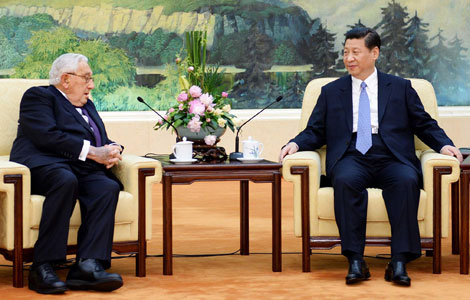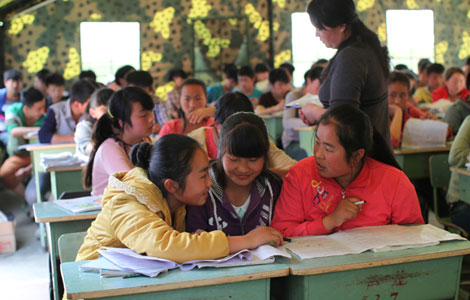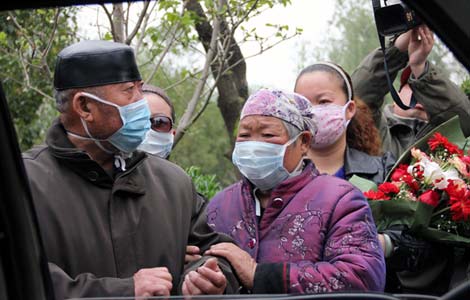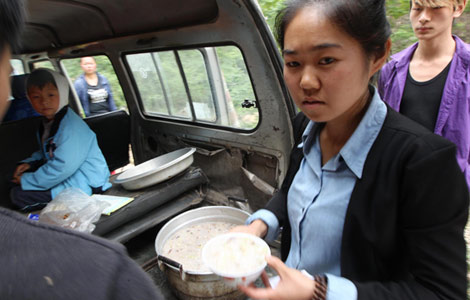Medical team offers care and comfort to elderly
Updated: 2013-04-26 08:15
By An Baijie in Baoxing, Sichuan, and Xu Wei in Beijing (China Daily)
|
||||||||
Sitting on a stool in a temporary shelter covered by tarpaulin, Ma Wenyu did not want to talk about what she remembers of the earthquake four days ago.
But that does not mean she has forgotten.
Any noise in the night can wake up the 79-year-old from Xinmin village in Baoxing county or make her want to shout out to others "it's coming, it's coming".
For many, the real trauma of the magnitude-7 quake that hit Ya'an city, which administers Baoxing, only started to surface days after it struck, especially among the elderly, some of whom have now started to show aggravated symptoms on top of the conditions they normally have to cope with.
"Being scared is more common among elderly people in the quake area, and it could result in an increase in their blood pressure or aggravate any diseases they had before the quake," said Gao Jiarong, deputy dean of Chongqing-based Xinqiao Hospital, which is attached to the Third Military Medical University.
Gao has led a team of 30 doctors into the quake-hit Lushan and Baoxing counties - the first medical team from outside Sichuan province to arrive at the epicenter.
Most of the houses in Ma's village, located at the foot of a mountain, were wood-built structures, which made them more susceptible to falling rubble and stones.
One boulder as large as 4 meters in diameter crashed down the mountain and landed just meters away from Ma's bedroom, flattening her storeroom.
The dreadful trauma of the event has raised her blood pressure and left her needing psychological counseling.
Another patient treated by the medical team was a 97-year-old patient in the Wulong township in Baoxing, who had refused to eat since the earthquake struck and was becoming nervous when others tried to communicate with him.
"As a woman, I thought I might be able to get him to relax enough to talk, but then I learned that his son was severely wounded in the earthquake and he said he was very worried by that," Gao said.
To make matters worse, many of the elderly residents were slow to react to the disaster, and some living in remote areas have been unable to access any medical help as the emergency centers were only located in densely populated areas.
"Some older people are unwilling to come to the medical centers in the settlements and have only come if they absolutely have to," Gao added.
"They would not normally go out much, and now the narrow mountain roads are suddenly risky with landslides and falling rocks, that's even less likely," she said.
Hu Kaixiang, a 71-year-old neighbor of Ma, who normally suffers from hypertension, is now suffering dizziness and arrhythmia.
Her husband, 73, hasn't dared to go back to their house, which suffered cracks in the walls, with parts of the roof damaged. He's decided to go back, instead, to their old family home on higher ground.
"It is impossible for medical teams to reach every village due to the poor road conditions," Gao said.
"Some villages in remote mountainous areas have still not been reached and we don't know whether elderly people there need help or not."
The quake areas were hit by steady rain on Monday and Tuesday, and the change in weather conditions has resulted in a number of residents catching influenza.
Antibiotics to treat alimentary and respiration infections are desperately needed as the number of patients increases, said Zhou Zheng, a neurosurgeon on Gao's medical team.
Meanwhile, there's also a growing need for diabetes and high blood pressure medicine, as the team gradually continues to work its way through quake-hit villages in the area, he added.
Most of the 30 doctors in the team from Xinqiao Hospital had experience of treating victims of the 2008 Wenchuan earthquake and say the experience has proved valuable this time.
Contact the writers at anbaijie@chinadaily.com.cn and xuwei@chinadaily.com.cn
(China Daily 04/26/2013 page5)
Most Viewed
Editor's Picks
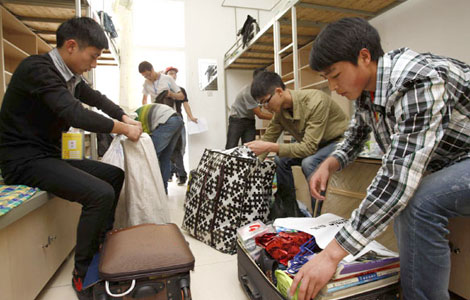
|

|

|

|

|

|
Today's Top News
Phone bookings for taxis in Beijing
Chinese consumers push US exports higher
Seoul delivers ultimatum to DPRK
Boston bombing suspects intended to attack NYC
No let up in home price rises
Bird-watchers undaunted by H7N9 virus
Onset of flood season adds to quake zone risks
Vice-president Li meets US diplomat
US Weekly

|

|
